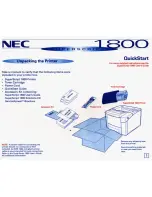
SSeettttiinngg U
Upp tthhee PPrriinntteerr
IInnssttaallllaattiioonn aanndd SSeettuupp
For reference:
•
Installation Guide
packaged with your printer
• Online Support Assistant at
www.xerox.com/office/VLC71XXdocs
Installation and Setup Overview
Before you print, ensure that your computer and the printer are plugged in, powered on, and
connected. Configure the initial settings of the printer, then install the print driver software and
utilities on your computer.
You can connect to your printer directly from your computer using USB, or connect to a network using
an Ethernet cable or wireless connection. Hardware and cabling requirements vary for the different
connection methods. Routers, network hubs and switches, modems, Ethernet cables, and USB cables
are not included with your printer and must be purchased separately. Xerox recommends an Ethernet
connection because it is typically faster than a USB connection, and it provides access to the
Embedded Web Server.
For more information, refer to the
System Administrator Guide
at
.
Selecting a Location for the Printer
1. Select a dust-free area with temperatures from 10-32°C (50-90°F), and relative humidity 10-85%.
Note:
Sudden temperature fluctuations can affect print quality. Rapid heating of a cold
room can cause condensation inside the printer, directly interfering with image transfer.
2. Place the printer on a level, solid, non-vibrating surface with adequate strength to hold the weight
of the printer. The printer must be horizontal with all four feet in solid contact with the surface. To
find the weight for your printer configuration, refer to
. Select a location
with adequate clearance to access supplies and to provide proper ventilation. To find the
clearance requirements for your printer, refer to
3. After positioning the printer, connect it to the power source and computer or network.
C
Coonnnneeccttiinngg tthhee PPrriinntteerr
Selecting a Connection Method
You can connect the printer to your computer using a USB cable, Ethernet cable, or wireless
connection. The method that you select depends on how your computer is connected to the network.
A USB connection is a direct connection and is the easiest to set up. An Ethernet connection is used
to connect to a network. If you are using a network connection, it is important to understand how
your computer is connected to the network.
Note:
Hardware and cabling requirements vary for the different connection methods. Routers,
network hubs, network switches, modems, Ethernet cables, and USB cables are not included
with your printer and must be purchased separately.
63
















































